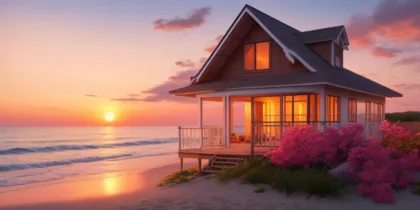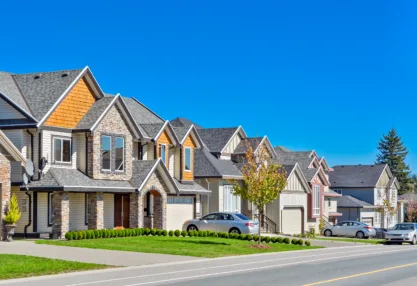Owning a second house can be an exhilarating prospect, opening doors to new opportunities for investment, relaxation, and creating lasting memories. The idea of having a retreat to call your own, whether it’s a cozy cabin in the woods or a beachfront getaway, sparks excitement and visions of idyllic moments spent with loved ones.
However, amidst the allure of second homeownership, it’s crucial to approach the decision with careful planning and consideration. Rushing into such a significant investment without thorough evaluation can lead to unexpected challenges and financial strain down the road.
In this guide, we’ll delve into the essential questions you should ask yourself when contemplating the purchase of a second house. By addressing these key considerations upfront, you can make informed decisions and ensure that your second home venture brings fulfillment and enjoyment for years to come. Let’s explore these questions together.
Table of Contents
AFFORDABILITY & FINANCES
Question 1: Can I truly afford a second home?
Before diving into the realm of second homeownership, it’s crucial to conduct a thorough assessment of your financial situation to determine if purchasing a second home is feasible. Consider the following factors:
- Current Debt: Evaluate your existing debt obligations, including mortgage payments, car loans, credit card balances, and any other outstanding loans. Ensure that you have a manageable level of debt relative to your income before taking on additional financial commitments.
- Retirement Savings: Assess the status of your retirement savings and investment accounts. Ensure that you’re adequately saving for your future before allocating funds towards a second home. Remember, prioritizing long-term financial security should take precedence over short-term desires.
- Down Payment Requirements: Determine the amount of cash you can comfortably allocate towards a down payment for the second home. Keep in mind that down payment requirements may vary depending on the type of property and financing options available.
While evaluating your financial readiness for a second home, it’s advisable to seek guidance from a financial advisor (we recommend a fee-only fiduciary financial advisor). A professional advisor can provide personalized insights based on your specific financial situation and goals. They can help you assess affordability, explore financing options, and develop a comprehensive plan to ensure that purchasing a second home aligns with your overall financial objectives.
By carefully considering these factors and seeking expert advice, you can confidently determine whether you’re financially prepared to take the leap into second homeownership. Remember, a well-informed decision today can pave the way for a rewarding and financially sustainable future.
Question 2: What are the ongoing costs involved?
When contemplating the purchase of a second home, it’s essential to look beyond the initial mortgage payment and consider the full spectrum of ongoing expenses. Here’s a breakdown of the key costs to factor into your budget:
- Property Taxes: Research the property tax rates in the area where you’re considering buying a second home. Property taxes can vary significantly depending on location and property value, so ensure you budget accordingly.
- Insurance: Homeowners insurance is essential for protecting your investment against potential risks such as fire, theft, and natural disasters. Obtain quotes from insurance providers to estimate the ongoing cost of coverage for your second home. Curious what kind of homeowners insurance you need when buying a second home? Check out this article at SmartAsset that covers everything you need to know about second home insurance.
- Utilities: Budget for monthly utility expenses, including electricity, water, gas, and possibly internet and cable services. Keep in mind that utility costs may fluctuate depending on usage and seasonal variations.
- HOA Fees: If the property is located within a homeowners association (HOA), factor in monthly or annual HOA fees. These fees typically cover maintenance of common areas, amenities, and community services.
- Maintenance and Repairs: Set aside funds for routine maintenance tasks such as lawn care, landscaping, HVAC servicing, and minor repairs. Additionally, budget for unexpected repairs or major renovations that may arise over time.
- Rental Income Potential: If you’re considering renting out the property when you’re not using it, factor in potential rental income. Conduct market research to estimate rental rates in the area and determine the property’s potential as a vacation rental or long-term investment.
By carefully accounting for these ongoing costs, you can ensure that you’re financially prepared to sustainably maintain and enjoy your second home for years to come. Additionally, exploring the potential for rental income can help offset some of the expenses associated with second homeownership and enhance the property’s overall financial viability.
Question 3: How will this purchase affect my overall financial goals?
As you contemplate the purchase of a second home, it’s essential to consider how this decision aligns with your broader financial objectives and long-term plans. Here’s why:
- Financial Alignment: Assess whether investing in a second home supports or detracts from your overarching financial goals. Consider how this purchase fits into your wealth-building strategy, retirement plans, and other major financial milestones.
- Opportunity Cost: Recognize that allocating funds towards a second home represents an opportunity cost. Money used for a down payment, ongoing expenses, and maintenance could otherwise be invested in assets that generate returns or contribute to retirement savings.
- Risk Management: Evaluate the potential risks associated with second homeownership and how they may impact your financial security. Consider factors such as market volatility, property depreciation, and unforeseen expenses when assessing the overall risk-reward profile of this investment.
By critically evaluating the implications of purchasing a second home on your broader financial goals, you can make an informed decision that aligns with your priorities and aspirations. Whether the second home complements your wealth-building strategy or introduces unnecessary financial strain depends on your individual circumstances and objectives. You should always prioritize long-term financial stability and prudent decision-making when weighing the pros and cons of second homeownership.
USAGE & FUNCTIONALITY
Question 4: What is the primary purpose of the second house?
When contemplating the purchase of a second home, it’s essential to clarify the primary purpose behind this investment. Different purposes entail distinct considerations and implications. Here are some common purposes for owning a second house and key considerations associated with each:
Vacation Getaway
Considerations when buying a second home as a vacation getaway:
- Location: Choose a destination that aligns with your lifestyle preferences and travel habits.
- Seasonal Usage: Determine how frequently you plan to use the property and whether it will be a seasonal retreat or year-round destination.
- Amenities: Evaluate the amenities and recreational activities available in the area to enhance your vacation experience.
Rental Property
Considerations when buying a second home as rental property:
- Rental Demand: Research the local rental market to gauge demand and rental rates for similar properties.
- Property Management: Decide whether you’ll manage the rental property yourself or hire a property management company to handle tenant relations and maintenance.
- Legal and Tax Implications: Familiarize yourself with landlord-tenant laws and tax regulations governing rental income in the area.
Investment Property
Considerations when buying a second home as an investment property:
- Market Analysis: Conduct a thorough market analysis to assess the potential for property appreciation and rental income.
- Cash Flow: Evaluate the property’s cash flow potential, factoring in rental income, expenses, and financing costs.
- Exit Strategy: Develop a clear exit strategy for the investment, considering factors such as resale value, market conditions, and long-term investment objectives.
Retirement Home
Considerations when buying a second home as a retirement home:
- Age-Friendly Features: Choose a property with features that accommodate aging in place, such as single-story layouts, accessibility modifications, and proximity to healthcare facilities.
- Lifestyle Considerations: Consider how the property supports your desired retirement lifestyle, including recreational amenities, climate, and proximity to family and friends.
- Long-Term Affordability: Assess the property’s affordability in retirement, factoring in ongoing expenses, healthcare costs, and potential changes in income.
By clarifying the primary purpose of the second house and carefully considering the associated considerations, you can make an informed decision that aligns with your lifestyle preferences, financial goals, and long-term aspirations. Each purpose offers unique opportunities and challenges, so take the time to weigh the pros and cons before moving forward with your investment.
Question 5: How often will I realistically use the second house?
When considering the purchase of a second home, it’s crucial to realistically assess how often you’ll use the property. Be honest with yourself about factors such as travel time, upkeep responsibilities, and the potential for vacancy. Here’s why:

- Travel Time: Consider the distance between your primary residence and the second home. Factor in travel time, transportation costs, and logistical considerations when estimating how frequently you’ll visit the property. A second home that’s conveniently located may encourage more frequent use, while a distant property may require more planning and commitment.
- Upkeep Responsibilities: Recognize that owning a second home entails ongoing maintenance and upkeep responsibilities. Be prepared to invest time, effort, and resources into caring for the property, whether it’s routine maintenance tasks, repairs, or landscaping. Assess whether you’re willing and able to fulfill these responsibilities regularly.
- Potential for Vacancy: Anticipate periods of vacancy when the second home may sit unused for extended periods. Consider factors such as seasonal fluctuations in usage, competing priorities, and unforeseen circumstances that may affect your ability to visit the property regularly. Be realistic about the potential for downtime and plan accordingly.
By honestly evaluating how often you’ll realistically use the second house, you can make an informed decision about whether the investment aligns with your lifestyle and priorities. Whether you envision frequent weekend getaways, seasonal retreats, or occasional visits, understanding your usage patterns will help you determine the feasibility and value of owning a second home. Remember to factor in all relevant considerations to ensure that the investment enhances your quality of life and aligns with your long-term goals.
Question 6: What features and amenities are essential?
When selecting a second home, it’s important to identify the features and amenities that are essential to meet your lifestyle preferences and needs. Consider the following factors:
- Size: Determine the appropriate size of the second home based on your usage requirements and preferences. Consider factors such as the number of bedrooms, bathrooms, and common living spaces needed to accommodate yourself, family members, and potential guests comfortably.
- Location: Choose a location that aligns with your lifestyle and desired activities. Whether you prefer a serene mountain retreat, a beachfront oasis, or a bustling urban enclave, prioritize locations that offer easy access to the amenities and attractions you enjoy.
- Proximity to Desired Activities: Evaluate the proximity of the second home to desired activities and amenities, such as outdoor recreational opportunities, cultural attractions, dining options, and shopping centers. Select a location that provides convenient access to activities that enrich your lifestyle and enhance your enjoyment of the property.

- Potential Renovations: Assess the potential for renovations or customization to align the second home with your preferences and vision. Consider whether the property requires updates or modifications to enhance functionality, aesthetics, or resale value. Factor in renovation costs, timelines, and regulatory considerations when evaluating renovation opportunities.
By identifying the features and amenities that are essential to your lifestyle and preferences, you can narrow down your search criteria and focus on properties that meet your needs. Whether you prioritize spacious living areas, scenic views, or proximity to recreational amenities, selecting a second home that aligns with your preferences ensures that your investment enhances your quality of life and brings you joy for years to come.
LOCATION & COMMUNITY
Question 7: Where do I want the second house to be located?
Selecting the ideal location for your second home requires thoughtful consideration of various factors that align with your lifestyle and preferences. Here’s what to research:
- Proximity to Family: Consider the proximity of the second home to family members and loved ones. If spending time with family is important to you, prioritize locations that allow for convenient visits and gatherings with relatives.
- Amenities: Research the availability of amenities and services in the area surrounding the second home. Look for nearby amenities such as grocery stores, restaurants, medical facilities, recreational opportunities, and cultural attractions that enhance your quality of life and provide convenience.

- Scenery: Evaluate the natural surroundings and scenery of potential locations for the second home. Whether you prefer mountain vistas, ocean views, serene lakeside settings, or vibrant urban landscapes, choose a location that offers scenery that resonates with your aesthetic preferences and enhances your enjoyment of the property.
- Accessibility: Consider the accessibility of the second home from your primary residence and other key destinations. Assess factors such as transportation options, travel time, and ease of access to major highways, airports, and public transit hubs. Prioritize locations that offer convenient accessibility to facilitate frequent visits and seamless travel experiences.
By researching these factors and considering how they align with your lifestyle, priorities, and preferences, you can identify the ideal location for your second home. Whether you seek proximity to family, convenient access to amenities, breathtaking scenery, or ease of accessibility, selecting the right location ensures that your second home enhances your quality of life and enriches your experiences for years to come.
Question 8: What is the neighborhood like?
Exploring the characteristics of the neighborhood surrounding your potential second home is essential to ensure that it aligns with your preferences and lifestyle. Here are key aspects to research:
- Crime Rates: Investigate the crime rates in the neighborhood to gauge its safety and security. Look for crime statistics provided by local law enforcement agencies or online resources. Additionally, consider factors such as neighborhood watch programs and community policing initiatives that contribute to a safer environment.
- Community Feel: Assess the sense of community and neighborhood dynamics. Explore opportunities to connect with local residents and gain insights into the community’s culture, values, and social activities. Attend local events, visit community centers, and engage with neighbors to get a feel for the neighborhood’s atmosphere and sense of belonging.
- Future Development Plans: Research any planned or ongoing development projects in the neighborhood. Look for information on infrastructure improvements, commercial developments, and residential construction that may impact property values and the overall character of the area. Consider how future development plans align with your long-term vision for the neighborhood.
- Potential Rental Market: If you’re considering renting out the property, assess the potential rental market in the neighborhood. Research rental demand, vacancy rates, and rental prices for similar properties in the area. Evaluate factors such as proximity to employment centers, educational institutions, and amenities that attract tenants and contribute to a thriving rental market. You may want to look into performing a Rental Market Analysis (RMA) for a robust evaluation that involves examining specific criteria to help you determine rental potential and risks for a given area.
By conducting thorough research and exploring these aspects of the neighborhood, you can gain valuable insights into its suitability for your second home investment. Whether you prioritize safety, community engagement, future growth potential, or rental income opportunities, understanding the neighborhood dynamics ensures that your second home enhances your lifestyle and meets your investment objectives.
Question 9: Are there any potential risks or concerns specific to the location?
When evaluating the location of your potential second home, it’s important to consider any specific risks or concerns that may impact your enjoyment of the property or its long-term value. Here are some factors to consider:
- Natural Disasters: Research the susceptibility of the area to natural disasters such as hurricanes, earthquakes, wildfires, or flooding. Assess the level of risk and the effectiveness of mitigation measures in place to minimize potential damage. Consider whether you’re comfortable with the associated risks and whether insurance coverage is available to protect against such events.
- Noise Pollution: Evaluate the presence of noise pollution sources such as busy roads, airports, industrial facilities, or nightlife districts. Consider how noise levels may impact your enjoyment of the property, especially if you prioritize peace and tranquility. Visit the area at different times of day to assess noise levels and gauge their impact on your experience.
- Usage Limitations: Investigate any limitations or regulations governing property usage, such as zoning restrictions, homeowners association (HOA) rules, or short-term rental regulations. Determine whether there are any restrictions on activities such as short-term rentals, home businesses, or property modifications that may affect your plans for the property. Ensure compliance with local regulations to avoid potential legal issues or conflicts with neighbors.
By identifying and addressing potential risks or concerns specific to the location, you can make an informed decision about whether the property aligns with your preferences and objectives. Whether it’s mitigating natural disaster risks, minimizing noise disturbances, or navigating usage limitations, understanding these factors ensures that your second home investment enhances your lifestyle and provides peace of mind for years to come.
Question 10: Am I truly confident and prepared to buy this second house?
As you approach the decision to purchase a second home, it’s essential to reflect on whether you feel confident and prepared to move forward with this significant investment. Consider the following recap of the questions explored:
- Financial Readiness: Have you thoroughly evaluated your financial situation and ensured that you can afford the second home without compromising your long-term financial goals? Are you comfortable with the ongoing costs and responsibilities associated with homeownership? Buying a second home is undoubtedly a big decision that can have a large impact on your finances and future. Contact your financial advisor if you have any concerns or questions when deciding to purchase a second home.
- Purpose and Usage: Have you clarified the primary purpose of the second house and how often you realistically plan to use it? Does the property meet your lifestyle preferences and provide the desired amenities and features?
- Location and Neighborhood: Have you thoroughly researched the location and neighborhood surrounding the second home? Are you comfortable with any potential risks or concerns specific to the area, such as natural disaster risks or usage limitations?
- Rental Considerations: If you’re considering renting out the property, have you assessed the rental market and potential income opportunities? Are you prepared to navigate landlord responsibilities and legal regulations governing rental properties?
By considering these questions and addressing any concerns or uncertainties, you can ensure that you’re making an informed and confident decision about purchasing a second home. Remember that thorough research, careful planning, and realistic expectations are essential to a successful second home investment. Take the time to weigh the pros and cons, seek advice from trusted professionals, and ensure that the decision aligns with your lifestyle, financial objectives, and long-term aspirations. With proper preparation and confidence in your decision, you can embark on this exciting journey of second homeownership with peace of mind and excitement for the future.

In Conclusion
Asking critical questions before purchasing a second home is essential for making an informed and confident decision. By thoroughly considering factors such as financial readiness, purpose and usage, location and neighborhood, rental considerations, and overall preparedness, you can ensure that the second home investment aligns with your lifestyle, preferences, and long-term goals.
It’s crucial to conduct thorough research, explore all available options, and seek professional guidance if needed. Financial advisors, real estate agents, and legal experts can provide valuable insights and support throughout the decision-making process, helping you navigate complexities and make well-informed choices.
While the decision to buy a second home involves careful consideration and planning, it also holds the promise of joy, relaxation, and lasting memories. Whether it’s a vacation retreat, rental property, investment opportunity, or retirement haven, owning a second house opens doors to new experiences and enriches your life in meaningful ways.
With careful preparation, diligence, and a clear understanding of your objectives, you can embark on the journey of second homeownership with confidence and excitement for the adventures that lie ahead. Take the time to ask the right questions, weigh your options thoughtfully, and embrace the potential joys of owning a second house.
Here’s to the fulfillment of your dreams and the creation of cherished moments in your second home. Happy house hunting!




